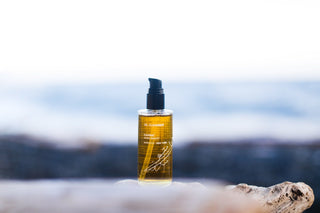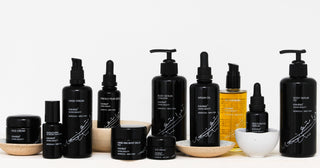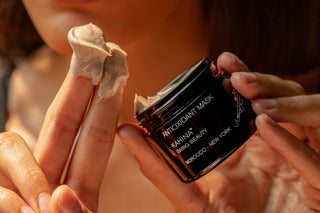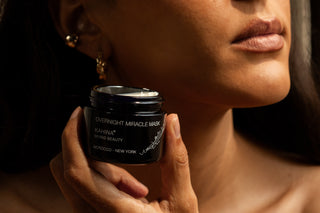RECOGNIZING THE ARTISAN HEROINES BEHIND THE BRAND
For centuries, the hard work of extracting oil from the nut of the argan tree has been performed by Berber women, the indigenous people of North Africa, many of whom live in Morocco’s argan region. The work is extremely labor intensive. It can take one woman up to eight hours to crack the nuts for one liter of oil. This labor provides the women with an opportunity for social and economic freedom that they would not otherwise have.
Most of these women cannot read nor write, so they use illustrative symbols to mark their identity. One such example is the five-pointed star—a key element in Arabic design that is drawn on the top of each Giving Beauty package. Encircled, this star is the emblem of the Moroccan flag.
In 2008, on one of her many visits to the cooperatives, Katharine collected the marks and signatures of several of the women who extract the argan oil for her products. As they wrote their names—some for the first time—they told Katharine stories through the aid of a Berber translator.
As a testament to their inner and outer beauty, their stories and signatures are shared here.
 FATIMA BASKAR
FATIMA BASKAR

Fatima is married with 2 children. She tells me that her husband is a very good man, very supportive of her and proud of her for working in the co-op. Like the others, Fatima takes special care in writing her signature when her turn comes to write her name.
 ZAHRA AMARIR
ZAHRA AMARIR

Zahra Amarir is married with 8 children. Before working in the argan cooperative, she did farm labor with her husband. She tells me it was very hard work and that she finds working in the co-op much more enjoyable. Zahra says the women she works with are like sisters to her. She was very excited to take the literacy class offered by the co-op and tries hard to write her name but she tells me she finds it difficult to learn something new at her age, so she writes her mark instead – a simple figure with two loops.
 ZAIMA IMCHURGA
ZAIMA IMCHURGA

60-year old Zaima has worked at the co-op for 6 years. Zaima’s husband works on others’ farms as a hired hand, but, because there is no work for him now, they are both are grateful for her income which allows them to provide for their six children.
Zaima’s name means beautiful in Arabic. I ask her if she feels beautiful. Her response is an emphatic, "yes!"
 ZAHRA ELKATIM
ZAHRA ELKATIM

Zahra, whose name means flower in Arabic, is a 61 year old widow with 7 children, one of which is physically handicapped. The money Zahra earns working in the co-op supports her large family.
 TAARABT BENFENZI
TAARABT BENFENZI

Taarabt Benfenzi has worked almost 9 years at the cooperative, an obvious source of pride for her. Like many of the women, Taarabt’s husband is without work. Her income provides for the needs of their whole family, and has paid for their home, furniture, electricity, water and schooling for their children.
 FATIMA BASKAR
FATIMA BASKAR
 Fatima is married with 2 children. She tells me that her husband is a very good man, very supportive of her and proud of her for working in the co-op. Like the others, Fatima takes special care in writing her signature when her turn comes to write her name.
Fatima is married with 2 children. She tells me that her husband is a very good man, very supportive of her and proud of her for working in the co-op. Like the others, Fatima takes special care in writing her signature when her turn comes to write her name.
 ZAHRA AMARIR
ZAHRA AMARIR
 Zahra Amarir is married with 8 children. Before working in the argan cooperative, she did farm labor with her husband. She tells me it was very hard work and that she finds working in the co-op much more enjoyable. Zahra says the women she works with are like sisters to her. She was very excited to take the literacy class offered by the co-op and tries hard to write her name but she tells me she finds it difficult to learn something new at her age, so she writes her mark instead – a simple figure with two loops.
Zahra Amarir is married with 8 children. Before working in the argan cooperative, she did farm labor with her husband. She tells me it was very hard work and that she finds working in the co-op much more enjoyable. Zahra says the women she works with are like sisters to her. She was very excited to take the literacy class offered by the co-op and tries hard to write her name but she tells me she finds it difficult to learn something new at her age, so she writes her mark instead – a simple figure with two loops.
 ZAIMA IMCHURGA
ZAIMA IMCHURGA
 60-year old Zaima has worked at the co-op for 6 years. Zaima’s husband works on others’ farms as a hired hand, but, because there is no work for him now, they are both are grateful for her income which allows them to provide for their six children.
Zaima’s name means beautiful in Arabic. I ask her if she feels beautiful. Her response is an emphatic, "yes!"
60-year old Zaima has worked at the co-op for 6 years. Zaima’s husband works on others’ farms as a hired hand, but, because there is no work for him now, they are both are grateful for her income which allows them to provide for their six children.
Zaima’s name means beautiful in Arabic. I ask her if she feels beautiful. Her response is an emphatic, "yes!"
 ZAHRA ELKATIM
ZAHRA ELKATIM
 Zahra, whose name means flower in Arabic, is a 61 year old widow with 7 children, one of which is physically handicapped. The money Zahra earns working in the co-op supports her large family.
Zahra, whose name means flower in Arabic, is a 61 year old widow with 7 children, one of which is physically handicapped. The money Zahra earns working in the co-op supports her large family.
 TAARABT BENFENZI
TAARABT BENFENZI
 Taarabt Benfenzi has worked almost 9 years at the cooperative, an obvious source of pride for her. Like many of the women, Taarabt’s husband is without work. Her income provides for the needs of their whole family, and has paid for their home, furniture, electricity, water and schooling for their children.
Taarabt Benfenzi has worked almost 9 years at the cooperative, an obvious source of pride for her. Like many of the women, Taarabt’s husband is without work. Her income provides for the needs of their whole family, and has paid for their home, furniture, electricity, water and schooling for their children.




